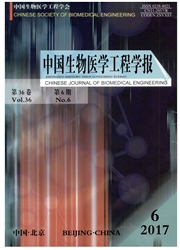

 中文摘要:
中文摘要:
基底材料的拓扑形貌是影响细胞行为的重要因素之一,材料表面微纳米图案化不但可以提供规则的结构模版,用以研究细胞对生长环境的响应特性,而且可以为组织再生用支架和植入性器件的设计提供基础数据。以表面具有微纳米沟槽结构的聚氨酯薄膜为基底材料,选择在促进组织修复和再生中起重要作用的成纤维细胞为模型细胞,通过细胞活性检测和免疫荧光分析,探讨材料表面的微纳米图案结构对成纤维细胞黏附、增殖、形态以及细胞骨架发育的作用。实验结果表明,微纳米沟槽结构能够明显促进成纤维细胞在材料表面的黏附和增殖,并诱导细胞响应所生长的微纳米沟槽结构进行骨架重排。
 英文摘要:
英文摘要:
Surface topography is one of the potential important factors for biomaterials, which influences cells behaviors such as cell adhesion, proliferation, differentiation and even apoptosis. It is clear that cells would respond to nanometric scale surface features, therefore it is possible to induce certain responses of ceils by fabricating substrates with combined micro-nano patterns. Herein, transparent polyurethane films with micro-nano groove patterns were prepared by solvent-casting from a template. Mouse fibroblast cells (3T3-L1) were seeded on the patterning films and cultivated for at least one week. Cell morphologies and cytoskeleton protein expression in the fibroblasts were observed with optical microscope and confocal laser scanning microscopy. Cells adhesion and proliferation were examined using MTS assay. Experimental results showed that the micro-nano groove pattern significantly enhanced the adhesion and proliferation of fibroblasts. The micro-nano groove pattern also showed effects in inducing cytoskeleton rearrangement as well as promoting actin and tubulin expression.
 同期刊论文项目
同期刊论文项目
 同项目期刊论文
同项目期刊论文
 Enhancement of nanofibrous scaffold of multiwalled carbon nanotubes/polyurethane composite to the fi
Enhancement of nanofibrous scaffold of multiwalled carbon nanotubes/polyurethane composite to the fi 期刊信息
期刊信息
